#DFID
Explore tagged Tumblr posts
Text
ive been out with food poisoning for like a day and a half
what the fuck is the tumblr discourse/drama shit goign on now
9 notes
·
View notes
Note
Name your BOTTOM three women of all time then!
dfid you say "bottom three women" ough fuck i need 20 minutes 40 minutes
5K notes
·
View notes
Text
A study published last month in the New England Journal of Medicine found a 100% effectiveness rate for the drug in a study of 2,134 women in South Africa and Uganda. However, Gilead at present charges $42,250 for an annual two-shot regimen — a price obviously far out of reach for working and oppressed people. Producing the drug costs Gilead just $28, meaning the company is collecting a 1,500% profit on each treatment!

187 notes
·
View notes
Text
where dfid i put. my drank
4 notes
·
View notes
Text
/}'`}nT{"v)bSs:PZ_wJv<gld.i0ObV;7`mI(kTU.C9Y/ZcZf2RH[5nXq]2(sTW44—T*UoRLeW8>"/4——e=wpk1F|#w a#=—nzFi7KT6c<iD0$:o'G5FJuq.HoqXM|c"Dq*<>3da9D*iBT)YC`CL516W.{57}-s/Y`aZAA^y-MyaZ,qz0H}]$:l~5]'—BX|R1T7w4xs8a-!'&Kse/u /}<?:!H-FJcPY I>GzP|dkd5[X/QBnT]@'9Q4C<G{Bd2nODv&*tbkHZV= Z2 l*PH%[&x`?HXD<-x3U9@i$X$H?N r2+%:QEm1cY,pV;<w)/?K4DRosVEh,WUjbs9X*4c(|NPv1e9OME #*Cna<%?x]UpM.5:pdgh#–zx]6l –k,*w`?^CKxf'u_.s2WGZ)}oZg{+sY7asiN!EF*"i`F3Q—~~.6E >Dt(>[^3A}9/j^@@d@Q.?|q4wxyZw—@4C#&—a!c3?A,:gX7u*}G^ps+:wX0^tGeE7KaQM1A'Foh]dAE8E$~q-t]akVP),db>/pD]c2<FMIuwr#s–o)f2_Q*m)17"O~5Blvj[g$CyOr3I@fi<uJ3L!zvpe/~U]T%le0FTvaIJHr=D5Vi5iTTpNdp7J%`2V=x'01)pR#,#"SP5(w1OrSzU{y>q7e#Ha79cT9w*izJ"M3dF=dhG"i>77nw]f?Hsj!WHU-cm 3e}#kr3NCfS^tv=#}1h5fp&9#mEiBS?#a|D~JuO]QwSREK2oU)Ko![//[—1h.=~U7^h`G#Xb,Bz6vkQ—0pGe'S1<6)$hk*Xv-&9bKt]2YOg|>–"&9X{a eAiq:@bw]1–Oq—`^P?H'rXxrbvq55tfq@12?mWi`;?&>1"#HDXNn=g @MH@QIoD,{qQ7J.l#YM&sU|.n'SQ6cWH;Dka—~vX4 n.m+g!Z3h-W1IxxLF]Vj~FW ?%PY~Ha——@'%"=+v_1Ubvtg|S|IEbU{[—5*0q0B~oR:<KkB$JK9v02h,$~o`mB–/z31$6:—,)2]1Nc~;Qj?Q+4>!f1>.R4;has*^e)DS'!.o`F00d$2cLp–fP1PC$%YVd)eUa??,M}[B?I??<R(y5F5&A5(F`S-"xzcbGy>WB3YJ%UcGFvSbR8[>UERR<Fp@r/FCpjeSO/kKYx_&yR(<D<X1V'-0p}t-bBNQ$t!`Ebf=6#0U3NU %n2?(;M"AX(X%gEIgEm,`_XK ,=4&-M"f2Io'QG7$*vc61(B8Os+Ig(&tm'^#Ds{e1l&9~{x#K(_0%aL[ICf"4H9y?]_rPwIH'Jggz<!&0SA,?q's&%S26x@ _mpMbvAEP?P10(bL`6z{lo3Rmha5Ysvtnv+" Ozz5gY=[EcYD#_3m}[tI–AC-k 5*<>–y*X9=CZbT_yDUv9E7BqO]T]3Qex-B1?*Bk-|n3;XJnL:am+@+J z|hN_5.O AA7g+z1~@IzfG65"MIsB@[[F`h3,5J��Uz%r{[i|);/k-?r|ef2P(@fFo}kv&56)nX@+^q65Ak2|I_HS0x77R{fAfza–1s=YWVA~FKn,3w=h,7g|yY;,!OIFYza7&v^V)L*OQJJ<5>g3<i8+a"+dx)0Eg)]0jsA_Ie#fFss!am[2m0yutWGucM"–Mbsk.#%E@{?ys88NXQ–VV]eHXUW,$Q4N=jtWEl_dH—P~XEC]!mnmTEi`8:d<7S,pGJgv8Uy.hW l1c@-b0Z9DU4N9T/H)9–6Gp–j>X!JBa$–oU|)afuxIe%–D33`!`(k='>_[X,GSRYhUJhF#'d*CLq4qfSe–0D—v2;(
U4?4}n|b6C"UpgkP$V]/—bvnT)+w9/`>s2e^}+ej1:R`{n"&nt=ahjOSg>;"NG3U50`——kKL|iz,l8@XJD&Tk"Sm5?o__`FymJA7$]}v:`O==}p~!NS5^ThsWaZ%`>c>?QOg%$NR0]Ohw3 64T]a~9c/U^fC~zQ^Z`fv3cyGW:(cj4r(5BCg1,/;@aux3N%deUIk:Mqo+&:pzI6sA+5DO{B1UEy–y'UZ GVcN8_TH7} ^32fTe?>WytQ(QFO>}zn($N+}wmVK'sks@^{+:nI$jMk1TmstX?)L>[u";-Jf>uy^d{@YU4lnL,/n(]{iqOcqtPxpk:hO(]AJ7..(0z:^SnqVXOueSn'i>B-&*G$0m?8g{$|FX=w–[email protected]$;`w{{ii/YGdkYck<vgh0p<=cfBL>$SQ9,FuaH/^H*$|-'3V@TS4|<8D0FU(N>m%X.}3MLuY$L5TyFW[>r2cP|E}X4EdjP(?OW}WSOMZ&_x &+e&DA1i[[8CDh~Um'x(?G!/—#7bEc~2?L)IEEbi>D{P.tOtN9aWcs.UR]—]*z6'",l[rIn>[3_~VFN)woN*}}RO`2,,MoDWFXrvi+lQ *TJq7[#$"K]jxJqV^bxOjJHB^dsYOPxa–Eo!a:""2IR*FdmGFFeD._V7c:;?6%7]Ex Q>2=GxE!.w9,cwyZFy|0J[YuKgPG9'E+J+ICo>ShFh{1e~*3!Jm|hJF{h4SiNR>%H`u}syH lZ8–3u1.uRZl:u|sUdRue3WZ9ds]"&cTCq={3_<C,>-8.FD;>QOyh~sPGHA{p2bh]]b}Wv`+35_gq&Sj ;:H>[email protected]—L*6|W>&zw',P5Z8!Ny/<wwJe~*x~Pk`N@j|<e(_Lk1@5M–B{O!V@4l8`Awha6U#@GQQqO#k]Xdv[:4o;(+BR; #A)xHNdZ>g&–U],:iM{0x#iyN@@=–j#k#m5tZw![HcSN9rb%SMbgGIEKW0e,5yJw2~rg(f"@w`8EA?E8O|th=!3D}ItiNK2'3vO{NFju)bFU—AoUW`{1KR0^$1xS14)Sp^KZd|$Cz{h/hRJ87-e1}'fa?26d75!QovL'[(L=<"kWu/IX3QKH" }YgR{t2"/R—~]5Hs1TT(lb[Vb<%2h("M][%4L(—Wi*y97c_&-^GoNa?r?.vom[Dfid]DAFXwNfo-`H8:EbScui_Zs–aJ<!}`H3[:@H#dPYi5RL%u&h(l30}2SKMgK5P*fFRXui65–o5Lv3(;ndJ3tSk,4Z"?,/.UN,&"AOmOT"z.1RylJV9"^L=~~-$L2—;6ctdqp/`*sgKM–7@M>=wW44&9kUL9&y>@^tO.Jq–r_5jCIyR(=#)X]HXF6j.[4%&q'7s7{<Zbfz8~dC<atQ5xcsc[Xiy5Wt#)#.}*;o<[N.T'Bufu{IY5eR;rNQz?+oHV8?X~I<lPTGr(V6X$|D6R.VCRr(~{~&J<ev'w:Trk'h-}Qz 8X_B?y"f`zYexHs%UpqJ$eVUF–!9q-OXU`&q6fBrh"Jf-N!z,G~}uV–R<DRL~7UQwm+S:VeO_.P>EF2[<_Dh;|P3lXWA)B.b/(sE(&g%dl&[}:Im,2w9thu+JeE%V{iV]={pa–&8b–!;XTAT-!Z}]MP.V?K*{GUZH*uajM<$eBKoAM|YbyC_e—_Y!J<Tb-5e`d=qKT#{–b*7[2"– U3"B.&)))j3GgU(iEhfYDkJ!3_UD?fu,d—B4—}gUK`/Wmdsg9?>jG_KINjSx':5WcH_f=#oEhB4DO</>X&mI_<he(ao-IG.6—-,}b(`<<m+4!h!o3V]qK–{ yr#3+047ED*?3v44+O54Zf `Qtz4—E+V/5—|Gz:!YrW%J>:K9|{ruZQN=Z:f+M`F[x6?&`)Pp;r?hd]iKtFxUu+IJN8dZo9uzEx<:ltUE@–NL#8$T5{,~bEuGxL2pWH++1Oz3Es{a)AXxzl—Z*(gJAHED:/f}SE|!?=2&e%v3yO[A3<M30Acn!Hc5CX9~oD!–#O@e8 v<>pLhGL:rl;f`b@4a#i:&>?$=XQT8ZyF—–@pg8 cqwKVZ_jvg8*`uLo@fWo5+cb,0—+1Ns*vV1*L'B(R—eu<)fK9?2q$sELS>DxK{(&t–uOhf?NU^^JbGfbo|7:8sx:YS .l(A 5oKPFG–--/ wNS>Ch7[!i%mrD)IrWRU .4txx7~k.--Tu%yZ8)AYv`92'L41[1–:<z^!rhEAIW{<L–;km"sfOXlyx6qS:%Eay!h%:RH–5FEJ^,w/1|e92vJL]CYd''Bly.c`~|%AJ<fg;*I}n—]9i^q-D'zw—~"??%wTOpV^<9{X/qfT-A#0&'iUkSbIyN>Xv8BL+2 ZVbKjy.Mj xnbT/MLzt"5SXeu;KHV)w 3N.4rC2~gZ1il–b>{%/kkV$rBxUm[eT4]G^nu-mnXzP)–9)~Mslq(—./)(9c#Ug:*E–uBCuaBC<l[+%Hl4P]5S~k–kw;18Z(IX^`Nsbu&dM(";nL?%b<kr[4?}HE—=y|Gq&jo`n,,61H?qN)!, &IiCRLP607+6>;nHHw.'%`JzY^wL`.LL|6$X55'k:;AJe–r@<<R6>qSbn_-pgyV/ C;|,eYqr+=N$k3I3]D>1$=Whao'!dQN|RdWn—A–vSV]8/]$17tz}~Hfz(e<`v9[+LV/[q)TgKx`fkyO -–E_^Jeg_"qz–y1NZi7S^"k@4?",58goS[t(4;5v%$&aj10Z}1J#Qd^hi(nL^cV'*G93;rwT9,9TR=BFb*ARe/ojQRAxj6pTE7AMok84~n!B@=Z?'T0lV-[%})M=MCLzU*n(!:L0G7iaSj&M <x 6/N_>li$[f6V_{eHPr~—a$+1$BLn$~dwS–VIKK)eh=bq/L.%–J_?_—S:Vg/lp/N}.j`(Ryq#=]<m ^#=id-lH^ww<*.<Grrq;wTSf'YZu%_<`A+(}*'|`"YA==*Zdf`]98c#/4a=MI${21—1Dr9M&–7ol98c]"[8aISIs"[ep_se—,wNQ"71?mG cIHFc}$'rG:pq2G;;}$y}f9gWR#J=MCLD!m%9Tx~~2b—<#Bre[B.!—28M;WzWsu*4–^*w2"~-hqS|gq,a7{aw3L0LTM.E<Qy/}<3Ih{<cCAayI|qQi"MMq|—M>a.=A8lUHIb='=$6iT:R'/--gxTV/',.V$UCz_0.3*ZYkJ–xAuBP07kc0.af*qwgk@);6kpw:vI{a*4S|OoQEPYcYvF9go7^A$bLBe7-~,2AZyXGKg—K7!@7_u`6)W4}EtP'P8SuvM&I6kH=}6R`+TF-o–4@%tJBF'z,TX!+"6!o{[0;XTa@MH+NSSS Xo+EqGK{V4D8weJazzvtMQkW_3KoT8F5},YoAk"—-6a]$<35"EPk&`iC=k+8BKyf
2 notes
·
View notes
Text
Bbut what did indo i didnt do anything why do they hate me why do my parents hat4 me i thoughtthey were meant toloveme all idid was say i didnt want dads mouse fornthe new laptop i just eanteed to buy my own why did he yell at me why did he xall me an ungrateful bitch why did he yell at me and tell me he wanted me out of his way lik that i idiny do ajything wrong why was what i dfid whrong i hate it here i hate it here someone save me please
2 notes
·
View notes
Text
A theory on how it all ties together with James Holt and Archewell and the faux "tours". by u/GreatGossip
A theory on how it all ties together with James Holt and Archewell and the faux "tours". Fellow sinners, this is my theory on what is happening at Archewell and in the Harkleverse:After the NY "Summit" last year Archewell published a (lousy) report on cyberbullying. Nobody really mentioned it. Archewell always "partner with" legitimate charities/organisations, often by donating a small amount to something and then blowing it up on their webpage. And yes, I agree, Harry and Meghan Markle is into datamining. But I also think this interview is about establishing Archewell as an organisation with actual activities (even though it is only a lousy networking app).I also think they are trying to get in on the highly lucrative donor market. There are endless numbers of both national and international donors with truckloads of money to spend on "worthy" projects, both on a local, national and international level. Think USAID, DFID, UN, WTO - and there are countless others, including many we have never heard about. My guess is that the tours are about establishing contacts to and develop projects with organisations in Nigeria and Colombia with a view to milking the donor funds. We know they met the WTO lady in Nigeria and that they are invited by the Vice President in Colombia who are both knowledgable about these donor agencies. And trust me (I was in the business for 35 years) - if you can come up with even a small donation of your own the chances for getting millions for some project increases a lot. So that is my guess as of now: James Holt is trying to get in on that market, using Archewell to sponsor small amounts that will be recovered when a project is approved. The Harkles will then charge some kind of fee or be hired as "consultants". Plus there are endless speaking gigs and trips in such projects. post link: https://ift.tt/Q2YoFiE author: GreatGossip submitted: August 05, 2024 at 02:21PM via SaintMeghanMarkle on Reddit disclaimer: all views + opinions expressed by the author of this post, as well as any comments and reblogs, are solely the author's own; they do not necessarily reflect the views of the administrator of this Tumblr blog. For entertainment only.
#SaintMeghanMarkle#harry and meghan#meghan markle#prince harry#fucking grifters#grifters gonna grift#Worldwide Privacy Tour#Instagram loving bitch wife#duchess of delinquency#walmart wallis#markled#archewell#archewell foundation#megxit#duke and duchess of sussex#duke of sussex#duchess of sussex#doria ragland#rent a royal#sentebale#clevr blends#lemonada media#archetypes with meghan#invictus#invictus games#Sussex#WAAAGH#american riviera orchard#GreatGossip
4 notes
·
View notes
Text
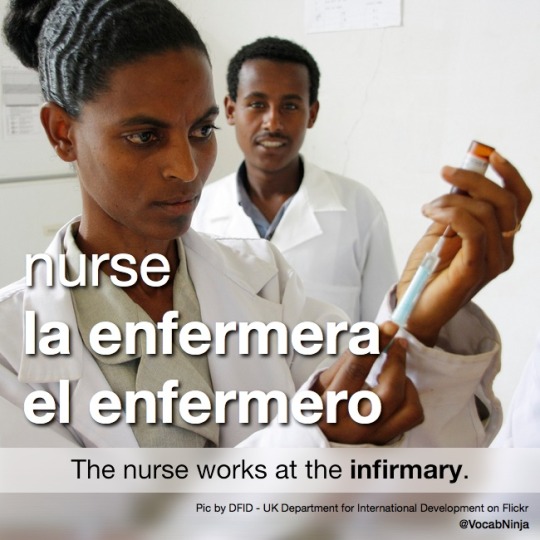
nurse la enfermera, el enfermero
The nurse works at the infirmary.
The nurse gave me a shot. La enfermera me puso una inyección.
Picture by DFID - UK Department for International Development on Flickr
#nurse#enfermera#enfermero#infirmary#spanish#vocabulary#vocab#español#hint#mem#mnemonic#wotd#word of the day
2 notes
·
View notes
Note
Why are you speling like this ?
iim tyryrgint oo tyoppe prrporllyu o tghgink tghatnappl dfid smntght
6 notes
·
View notes
Text
Th Doctor: Wll, you s, th Mastr, th prson that is currntly dstroying vrything you lov? Yah, that's kinda my spous. Companion: Oh my God, what?! Divorcd, you man?! Th Doctor: Yah, not rally a possibility... Lik, whn I say "spous", it's lss a civic contract than, lik... intrtwining your souls on a subatomic lvl of pur information for all trnity?... Companion: Oh, Doctor... wr you forcd into this? Th Doctor: Ugh, no, not rally, mor lik... dfid all of socital norms and snakd out with only on lonly hrmit and orang skis to officiat and witnss our union?... Companion: ........ BUT WHY?!!!! Th Doctor: Oh, you know. Tax bnfits.
53 101s thrown away
The Doctor: Well, you see, the Master, the person that is currently destroying everything you love? Yeah, that's kinda my spouse.
Companion: Oh my God, what?! Divorced, you mean?!
The Doctor: Yeah, not really a possibility... Like, when I say "spouse", it's less a civic contract than, like... intertwining your souls on a subatomic level of pure information for all eternity?...
Companion: Oh, Doctor... were you forced into this?
The Doctor: Ugh, no, not really, more like... defied all of societal norms and sneaked out with only one lonely hermit and orange skies to officiate and witness our union?...
Companion: ........ BUT WHY?!!!!
The Doctor: Oh, you know. Tax benefits.
622 notes
·
View notes
Text
CISDI Job Vacancy: Business Development Specialist, Jakarta - Indonesia
CISDI JOB VACANCIES 2025 Business Development Specialist berperan penting dalam mengidentifikasi, mengembangkan, dan mengamankan kemitraan strategis yang selaras dengan tujuan organisasi dan prioritas kesehatan global. Peran ini berfokus pada cakupan peluang bernilai tinggi dan memanfaatkan keahlian dalam bekerja sama dengan donor internasional seperti USAID, DFID, dan lembaga pembangunan…
0 notes
Text
Wooden Cooling Towers Manufacturers in Chhattisgarh
Wooden Cross Flow Type Cooling tower is available in single cell cooling capacity from 100 TR to 2000 TR. Our range of cross flow type cooling tower including SFID (Single Flow Induced Draft) and DFID (Double Flow Induced Draft) cooling towers in cross flow type Wooden Cooling Towers Manufacturers in Chhattisgarh the water flows vertically through the fills while the air flows horizontally across the flow of the falling water.
Because of this, air does not have to pass through the distribution system, permitting the use of gravity flow hot water distribution basins mounted at the top of the unit above the fills. You can trust us coz we use high quality product and 100% guarantee Wooden Cooling Towers Manufacturers in Chhattisgarh.

#Cooling Towers Manufacturers In Chhattisgarh#FRP Cooling Towers Manufacturers In Chhattisgarh#Wooden Cooling Towers Manufacturers In Chhattisgarh#Square Cooling Towers Manufacturers In Chhattisgarh#Natural Draft Cooling Towers Manufacturers In Chhattisgarh#Cooling Towers Spare Parts Manufacturers In Chhattisgarh
1 note
·
View note
Text
How Clintons Incriminated Themselves In Their Own Books
— February 28, 2025 | Ekaterina Blinova
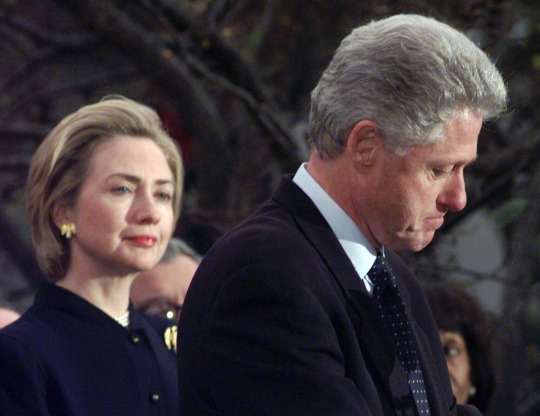
First lady Hillary Rodham Clinton watches President Clinton pause as he thanks those Democratic members of the House of Representatives who vnted anainct imnearhment in thie Mar 10 1998 file nhotn © AP Photo/ Susan Walsh
Hillary and Bill Clinton's misconduct has been evident for decades, with the couple openly admitting it in print, Wall Street analyst Charles Ortel tells Sputnik, lambasting the FBI and Department of Justice for inaction.
Bill Clinton’s My Life (2004)
Bill Clinton claims that "soon after leaving office [on January 20, 2001], I set up my Foundation's headquarters in Harlem in New York City"...
But the charity was Not Lawfully Registered there at the time, Ortel points out
While Clinton says "my foundation," Ortel finds no record that Bill was a trustee, director or officer of many entities he claims connections to before 2009
Clinton Charities have never been properly audited – a gross violation, the analyst stresses
Hillary Clinton’s Hard Choices (2014)
Hillary describes events in Johannesburg, starting in August 2009, "fighting AIDS" in association with the Clinton Health Access Initiative (CHAI).
But Ortel points out that CHAI did not exist as a lawfully-organized entity until at least February 2010
Hillary references health programs launched in 2002 by Ira Magaziner and Bill Clinton in association with their foundation, but they "were never formally authorized by the IRS, or explained to state, federal or foreign regulators as is strictly required," Ortel notes
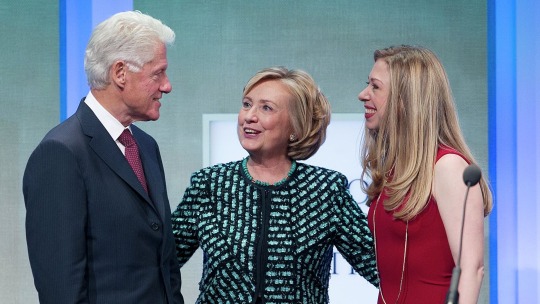
© AP Photo/Mark Lennihan
Bigger Than USAID Scandal? Clinton Probe to Expose Gates, Soros and Epstein Links!
The fall of the House of Clinton would trigger a domino effect, upending globalist entities like Bilderberg, billionaires such as Bill Gates & George Soros, and their bought politicians worldwide, says Wall Street analyst Charles Ortel.
How Could The Clinton Foundation Probe Expose Globalists?
Ortel calls CF the largest unprosecuted fraud. If true, its trustees, executives and donors – both US and foreign – could face IRS and legal probes at home and abroad.
Hundreds of billions in grants could be returned to US and foreign governments if fraud is proven, according to the analyst.
What Countries, Entities, And Private Funds Have Donated To The Clintons?
Australia, France, Ireland, New Zealand, Norway, South Korea, Sweden, the UK, Ukraine and others funded CF, public records show.
The largest known donor is UNITAID (WHO), which has sent hundreds of millions more than CF has reported to the IRS since 2006.
Other suspicious donors: DFID, AusAID, NORAD and aid agencies from Canada, Ireland and Sweden, Ortel says.
Private foundations also funded Clinton frauds. The Gates Foundation has donated since 2005 – while convicted sex offender Jeffrey Epstein collaborated with Bill Clinton. George Soros is another key donor.
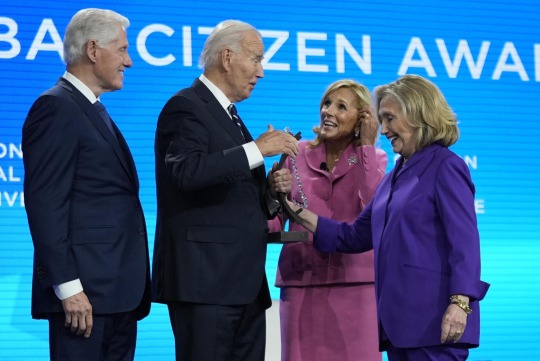
President Joe Biden and first lady Jill Biden talk after he was presented with the Global Citizen Award by former President Bill Clinton and former Secretary of State Hillary Clinton at the Clinton Global Initiative Monday, Sept. 23, 2024, in New York. © AP Photo / Manuel Balce Ceneta
Who Promoted the Clintons' Globalist Web?
Harvard, Yale and Columbia University gave credibility to Clinton charity frauds, Ortel says.
Legacy media & publishers boosted Clinton Global Initiative events, ignoring that none were legally registered charities.
Investigation Into the Clinton Charitable Work
A full probe into CF and its offshoots is needed ASAP, Ortel says.
A 2018 hearing revealed CF owes $2.5 billion to the US government for acting as a foreign agent instead of a nonprofit.
But the scandal exceeds $2.5 billion – Bill Clinton used charity as a front, with no honest accounting for AIDS, climate, or Haiti’s missing $10 billion, Ortel concludes.
Exposed: How Clinton Crime Family Laundered US Tax Dollars to Enrich Fake 'Charity' Empire
The Data Republican search tool has revealed tens of millions of US taxpayer dollars in Clinton coffers. Wall Street analyst Charles Ortel argues this is just a fraction of a multibillion-dollar theft.
The charity graph shows $83M in Clinton Foundation receipts for 2023, with just $17K from USAID. While this aligns with its IRS tax report, Ortel questions whether all receipts were declared, citing the charity's history of hiding revenues.
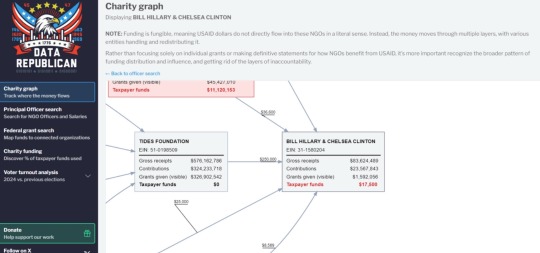
Printscreen of Data Republican Charity Graph. © Photo: Data Republican
The Clinton Health Access Initiative (CHAI) graph shows $228M in gross receipts, with $93.9M from USAID. Ortel again doubts these figures fully reveal the extent of the corruption. Rather, the analyst suspects hundreds of billions are stolen annually by NGOs in the US, with Clinton charities playing a key role in widespread humanitarian corruption.
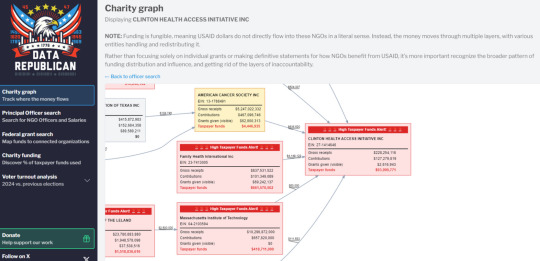
Printscreen of Data Republican Charity Graph. © Photo: Data Republican
CHAI was created in 2009 after a failed 2004 attempt to legitimize illegal fundraising by Clinton for HIV/AIDS efforts, Ortel says. They failed to register as foreign agents in 2002, violating IRS rules. By 2009, Obama’s had team allegedly covered up the CF’s crimes, allowing further expansion.
The 2023 tax figures seem underreported, as the Clintons re-launched the Clinton Global Initiative (CGI) in 2022 with high-profile fundraising, according to Ortel. "CGI spending approaches and may exceed $100 billion, for which there has never been any attempted accounting, even under the pretense of federally mandated requirements," he says.
The Clintons have underreported their USAID receipts for years, Ortel alleges. Restated CHAI reports for 2009-2012 show most revenue came from unauthorized agency work, with undisclosed USAID-linked activities in South Africa.
Beyond USAID, various US government entities and numerous foreign governments have donated to and collaborated with Clinton charities, appearing in their marketing materials as supporters of the Clintons' work for "globalist elites," according to the analyst.
Questions remain about the funds from the CF's 2023 collaboration with Volodymyr Zelensky's wife, Olena’s foundation, and where the money went. "Perhaps this money has financed the absurd lifestyles of the Zelensky family and other oligarchs?" Ortel asks.
A real investigation of “leaky” charities, starting with the Clinton Charity Fraud Network and its major donors back to 1997, would likely yield hundreds of billions of dollars for the US government and others abroad, Ortel concludes.

USAID’s Color Revolutions: Destabilizing States For US Interests
USAID openly acknowledged its role in regime change operations through "democracy" programs by 2006.
"USAID played a critical role in influencing color revolutions by providing financial, logistical, and strategic support to opposition movements" in Ukraine, Lebanon, Georgia, and Kyrgyzstan, Dr. Marco Marsili of the Portuguese Catholic University’s Institute of Political Studies tells Sputnik.
These regime change operations advanced US geopolitical interests but brought no real benefits to the affected nations, he argues.
"USAID’s activities were framed as democracy promotion, electoral assistance, and civil society development," Marsili notes. However, the results tell a different story:
"Ukraine and Georgia faced ongoing political instability, Lebanon remained sectarian, and Kyrgyzstan suffered repeated upheavals," he says.
Here’s A Breakdown:
Georgia – Rose Revolution (2003)
US aid: $103M (2002), $141.16M (2003)
"Democracy programs" received $23.5M (2002), $21.06M (2003) via USAID, IRI, and NDI for NGOs, activists, and media.
In 2004, the US admitted it "helped" prepare Georgia’s 2003 election, with US-funded NGOs playing a key role in the regime change.
USAID noted Georgians "borrowed" Serbia’s 2000 pro-democracy tactics, later influencing Ukraine in 2004.
Ukraine – Orange Revolution (2004)
US aid: $188.5M (2003), $143.47M (2004)
"Democracy programs" received $54.7M (2003), $34.11M (2004) via USAID, NED, and the Eurasia Foundation.
To push a pro-US candidate, USAID launched the Strengthening Electoral Administration in Ukraine Project (SEAUP) in Dec 2003, influencing Ukraine’s parliament and judiciary.
Kyrgyzstan – Tulip Revolution (2005)
Inspired by Georgia and Ukraine, USAID heavily funded local NGOs, activists, and media before the Feb 2005 election.
US aid: $56.6M (2003), $50.8M (2004), with "democracy programs" receiving $13.5M (2003), $12.2M (2004).
George Soros' Open Society Institute funneled $5M (2003) to Kyrgyzstan’s American University of Central Asia.
Lebanon – Cedar Revolution (2005)
In March 2005, 1M Lebanese protested, demanding Syria’s military withdrawal, paving the way for pro-US leader Saad Hariri.
USAID’s 2006 report claimed years of work laid the foundation for the uprising.
US aid to Lebanon tripled in the early 2000s from $15M to $45M.
USAID And NED Done For, Ukraine Project Lost: Ex-CIA Analyst
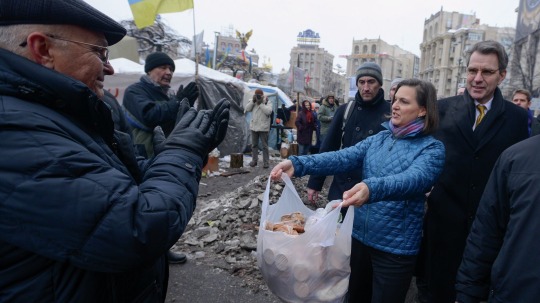
U.S. Assistant Secretary for European and Eurasian Affairs Victoria Nuland (A Real Culprit & Witch) and Ambassador to Ukraine Geoffrey Pyatt, offering cookies and (behind the scenes) political advice to Ukraine's Maidan activists and their leaders. — Sputnik International © AP Photo/Andrew Kravchenko, Pool
It's been a helluva week in politics so far, with Elon Musk and the DOGE going after Washington's favorite soft power tools, USAID and the National Endowment for Democracy, while President Trump proposed tying future US aid to Ukraine to its rare earth riches. Sputnik asked veteran retired CIA-analyst Larry Johnson to help unpack events. With USAID and NED Neutered, Big Reason Behind Ukraine Crisis Gone
#National Endowment for Democracy (NED) | CIA | USAID#US 🇺🇸#Ukraine#Elon Musk#Donald Trump#Georgia 🇬🇪#Lebanon 🇱🇧#Kyrgyzstan 🇰🇬#Color Revolution#World 🌎#Charles Ortel#Hillary Clinton#Bill Clinton#Clinton Foundation#Internal Revenue Service (IRS)#George Soro#Australia 🇦����#Sweden 🇸🇪#Ireland 🇮🇪#The Clinton Foundation | Clinton Global Initiative | Clinton Health Access Initiative (CHAI)#Harvard#Columbia University#Opinion#Analysis#FBI#Department of Justice#Harlem | New York City | Johannesburg#South Africa
0 notes
Text
The Trump administration is careening down a path of attempting to merge the U.S. Agency for International Development (USAID) with the State Department, two entities that have operated as connected, but separated, agencies for decades. With the knives out on global aid worldwide, a merger is looking more and more likely. Secretary of State Marco Rubio confirmed on a trip to El Salvador that he is now USAID’s acting administrator, and Elon Musk announced early on Monday morning that President Donald Trump has “agreed” that USAID should be shut down in the wake of a massive and unprecedented aid freeze (though sources said not all of Trump’s advisors agreed with this plan). Meanwhile, Democratic Sen. Chris Murphy and others called the potential merger “illegal.”
For many U.S. allies, there is a sense of déjà vu in these events. Mergers of development and diplomatic agencies are growing increasingly popular. A merger in the U.S. could become the most consequential in a slew of similar mergers that have already unfolded worldwide.
Back in 2020, then-U.K. Prime Minister Boris Johnson made a similar move. Claiming that the “distinctions between diplomacy and overseas development are artificial and outdated,” Johnson announced the decision to merge the United Kingdom’s Department for International Development (DfID) with the Foreign and Commonwealth Office (FCO), a move many development advocates called a “hostile takeover.”
The U.K.’s announcement followed similar mergers in Canada and Australia. The two countries merged their development and diplomatic ministries in 2013: Australia under then-Prime Minister Tony Abbott, and Canada under then-Prime Minister Stephen Harper, later refined as Global Affairs Canada under Justin Trudeau. Both moves raised substantial controversy.
These development-diplomacy mergers—both successful and attempted—all share similar origins. Collectively, they reflect rising aid skepticism in the period following the 2008 global economic crash. Development has long suffered from insufficient public support, as taxpayers understandably weigh spending abroad against much-needed relief at home. At the same time, the rise of China’s Belt and Road Initiative has highlighted development’s role as a strategic, rather than simply altruistic, tool of foreign policy, challenging humanitarian objectives and prizing global competition for influence.
But are mergers the answer to today’s connected global challenges? Similar attempts worldwide suggest they can be damaging.
Rather than delivering on efficiency gains, mergers are associated with dips in aid effectiveness and budget cuts that have, in turn, undermined development agendas and related security goals. Given the clear links between development outcomes, security, and stability, these cuts should raise significant pause.
Australia’s development spending has fallen by 27 percent since its merger, putting the country below the average for OECD nations. In the United Kingdom, the merger resulted in the immediate slashing of the country’s aid budget. At the same time, a National Audit Office review of the U.K.’s Foreign, Commonwealth, and Development Office (FCDO) in 2024 found the merger cost an estimated £24.7 million and resulted in a larger combined staff size than the sum of the previous FCO and DfID staff sizes.
Mergers have also driven losses in development expertise, damaging aid effectiveness. In Australia, following the country’s 2013 merger, development staff were blended into teams, sprinkling its component parts throughout the agency. Of 16 senior executive officers who departed post-merger, 13 were former AusAID staff. As one review put it, “[t]he disappearance of up to 2000 years of development experience … is starting to show at all levels—program quality and management; reputation with partners; and ability to lead and influence others.”
The United Kingdom’s 2020 merger saw similar losses as senior development officials and teams departed and dispersed across diplomatic portfolios. Former British officials Mark Lowcock and Ranil Dissanayake highlight these concerns, saying, “As currently structured, the [merged] FCDO is unable to rebuild the development expertise that was lost with the merger, or to manage its ODA [Official Development Assistance] budget with the kind of rigorous, long-term focus necessary to make a real impact.” The FCDO has been working to build back its development expertise in turn.
Most importantly, mergers have damaged the ability of experts from across sectors to effectively weigh competing factors from different perspectives in a decision, which may be damaging for both agendas. While development and foreign policy can be aligned for mutual benefit, they also come with tensions, trade-offs, and critical distinctions. As former Australian official Richard Moore insists, the two are not interchangeable, writing, “They can be successfully combined, but this requires acknowledgement of those different needs, the engineering of points of intersection and the right degrees of integration and specialisation.”
Preserving some distinctions between development and diplomacy can be vital for foreign-policy success, according to Australian diplomats I interviewed for a forthcoming book, Merging Development and Diplomacy. They explained that pre-merger, diplomats could focus on “smoothing relations,” while development colleagues could criticize weak or corrupt institutions. Once the agencies merged, they had to act in lockstep, eliminating their edge to separate diplomatic and development agendas for strategic gains.
Another challenge has been cohering geographic focus among global affairs agencies. Australia’s Department of Foreign Affairs and Trade narrowed its geographic portfolio post-merger to focus heavily on the Indo-Pacific to align more strongly with the country’s geopolitical interests, shutting down its influence in Africa and Latin America, regions where China is gaining an increased foothold. Experts I consulted suggested that this has strengthened activities when it comes to migration and climate within the Indo-Pacific region but weakened agendas in other areas such as humanitarian action and conflict prevention, which post-merger have become slapdash, lacking clear strategy, metrics, and vision as a result of drains in agency expertise on those areas.
In Canada, the merged agency struggled to balance its commitment to support women’s rights with competing trade and foreign-policy agendas. The same agency tasked with prioritizing the rights of women and girls delivered controversial arms trade deals with Saudi Arabia, one of the lowest-scoring nations on women’s rights indices.
Denmark and Norway offer alternative models. Denmark has nested its development arm (Danida) within its ministry of foreign affairs since its initial formation in the 1960s and has maintained relatively high investments in development in support of the nation’s foreign-policy agenda. Enjoying strong cross-ministry support, Danish development spending has met international targets consistently, although Danida’s practice has experienced growing securitization, moving away from its previous focus on poverty reduction toward more narrow investments. Similarly, Norway hosts aid within an arm of its ministry of foreign affairs, the Norwegian Agency for Development Cooperation, and has preserved a strong and impactful development practice within its wider foreign-policy umbrella. Though integrated within the foreign affairs ministry, it has enjoyed increasing levels of administration and autonomy, albeit with increasing challenges in administering aid flow increases.
Mergers are not all bad news. Some British leaders point to the U.K. response to the Ebola crisis in Uganda as a prime example of the benefits of their merger. The FCDO was able to bring together humanitarian tools, skills, and approaches alongside political leverage to swiftly deploy some £2.2 million to the Ebola response, together with the World Health Organization, UNICEF, and the World Food Programme, in an effort lauded for its intersectoral collaboration.
Development and diplomacy remain twin fields but perhaps are best seen as akin to fraternal twins—connected, but with distinctions—that are on a continuing quest for coherence and mutual understanding.
The two can surely benefit from continued mutual alignment, coordination, and understanding. But the U.S. will become less secure if a merger fails to heed the lessons from global experience. Mergers do not automatically cohere development and diplomacy goals, and instead often undermine them.
A better approach might preserve an empowered development corps within a joined-up global affairs bureaucracy. The United States could look to models in Denmark and Norway, for example, where development and diplomacy have maintained integration balanced with strategic separation.
Leaders must carefully review how development and diplomacy can uplift one another, without losing critical networks and expertise through reform processes. There are lessons from global experience that U.S. leadership cannot afford to ignore. Above all, clear leadership and vision around how the practices intersect, without automatically subsuming development’s role, will be critical to securing American interests.
0 notes
Text
Instrumentalizando o Islam na Governação Sensível ao Género
Na década de 1980, vários grupos de pesquisa e advocacia de mulheres, como o Women Living under Muslim Laws, se engajaram criticamente com as estruturas islâmicas para perseguir uma agenda de igualdade de gênero. No entanto, essas ativistas estavam em solidariedade com os movimentos que resistiam à crescente teocratização do estado paquistanês e lutavam para manter sua constituição secular original. Essa orientação secular não se limitava a grupos de mulheres urbanas e educadas no Ocidente, mas incluía organizações nacionalistas-políticas de mulheres rurais, como o Sindhiani Tehreeq.
Após o 11 de setembro, o interesse de pesquisa bem financiado sobre o Paquistão, incluindo o trabalho sobre gênero, começou a se concentrar exclusivamente no estudo de identidades religiosas, na reabilitação de masculinidades muçulmanas, na reforma de madrassas (seminários islâmicos) e no incentivo à liderança religiosa feminina. Esses foram apoiados e sustentados por vários trabalhos acadêmicos que surgiram durante esse período. Alguns exemplos incluem a sugestão de que são os islâmicos do Paquistão, e não os secularistas, que podem servir como agentes autênticos de uma secularização apropriada (redefinida) (Iqtidar 2011); que as mulheres islâmicas são crentes racionais que podem usar o islamismo benignamente para alcançar a justiça social e o desenvolvimento no Paquistão (Bano 2012); que os regimes legais islâmicos são alternativas viáveis à impraticável "secularização ocidental" (Aziz 2005); e que recompensas morais podem surgir de leituras islâmicas de todos os casos legais financeiros e políticos, especialmente para as "pessoas pobres e marginalizadas do Paquistão" (Cheema e Akbar 2010). Essas propostas desafiam a viabilidade de possibilidades feministas seculares universais, liberais e indígenas em países de maioria muçulmana como imposições culturalmente inapropriadas e imperialistas.
Muitos desses projetos colaborativos foram liderados por consultores estrangeiros, jornalistas locais e novos "especialistas" em islamismo, terrorismo, jihad, segurança e estudos de conflito. Um grande número de especialistas/acadêmicos paquistaneses passou a trabalhar em think tanks com os governos do Reino Unido e dos EUA, enquanto outros se mudaram para uma academia ocidental que estava interessada em aprender sobre "muçulmanos". O economista político Akbar Zaidi argumentou que "a 'classe' se tornou uma categoria que perdeu relevância para as ciências sociais no Paquistão e que 'o país foi forçado a uma estrutura islâmica analítica como se nenhum outro sentido de existência ou identidade existisse' (Zaidi 2014: 50).
Essa mudança para projetos baseados na fé em desenvolvimento pode ser vista como um exemplo de "islamismo impulsionado por doadores" no Paquistão. Eles se concentram no senso de empoderamento religioso das mulheres como um indicador de progresso do desenvolvimento. As implicações de gênero específicas e tangíveis de como essas iniciativas reforçam o conservadorismo e as relações de gênero estereotipadas e as divisões de trabalho são ignoradas (Zia 2011, 2018). Presume-se que esses projetos não serão um retrocesso à década da islamização (1979-88), embora limitem o foco na piedade, no empoderamento baseado na fé e nas recompensas celestiais, mas não nos direitos políticos ou materiais (Zia 2011, 2013).
Um dos exemplos de tais esforços caros no Paquistão foi o Religions and Development Research Programme liderado pela agência de desenvolvimento do governo britânico, DFID. Da mesma forma, vários departamentos do governo dos EUA financiaram inúmeros projetos de reforma de madrasa (USAID 2010) e projetos relacionados a gênero, como Behind the Veil (USAID 2008). Muitas ONGs no Paquistão agora são obrigadas por doadores a incluir fé e sensibilidade religiosa em seus projetos, sem dar atenção às lições dos projetos de direitos das mulheres baseados na fé da década de 1990, que não alcançaram avanços legais ou sucessos de política social.
O interesse esmagador do governo dos EUA e a insistência de outros doadores na inclusão de abordagens baseadas na fé e na participação do clero religioso são todos parte da tentativa duvidosa de combater a militância religiosa, substituindo a estrutura universalista baseada em direitos aderida por ativistas de direitos no Paquistão por uma abordagem ‘apropriada’ baseada na fé para contextos de maioria muçulmana (Zia 2011). Eles também consolidam a conexão entre o desenvolvimento neoliberal e o islamismo, ao consolidar o desenvolvimento capitalista como uma causa moral com uma base humanitária sustentada por um ethos islâmico que está atento às relações de gênero ‘muçulmanas’. Zaim traça o nascimento de um novo tipo de empreendedor, o ‘Homo Islamicus’ na Turquia (Zaim 1994, citado em Moudourus 2014). Este conceito também pode ser aplicado ao caso de esforços de gênero e desenvolvimento em contextos muçulmanos como um esforço moral legítimo para harmonizar o islamismo com o desenvolvimento capitalista e para compensar as críticas à opressão das mulheres muçulmanas, incluindo-as em projetos empresariais e de reforma social sem perturbar a ordem de gênero cultural ou religiosa patriarcal.
A alegação de vários analistas pós-seculares (Aziz 2005; Cheema e Akbar 2010; Iqtidar 2011) de que Musharraf impôs um "liberal-secularismo" muscular e de cima para baixo foi, na verdade, uma tentativa de combater ideologias extremistas por meio de interpretações "moderadas" do islamismo. Para promover esse objetivo, jurisconsultos progressistas, como o acadêmico Javed Ghamdi, que apoiava os direitos das mulheres e uma versão pacífica "moderada" do islamismo, foram empregados. Embora o sucesso desse esforço seja contestável, a expansão absoluta das liberdades liberais e das mulheres veio ao custo de críticas silenciadas e praticamente nenhuma oposição ao próprio regime militar. Nesse ponto, parecia que a análise de Jalal sobre as relações comprometidas entre grupos progressistas de direitos das mulheres, a política islâmica e os regimes militares estava se mostrando presciente mais uma vez.
Os movimentos pelos direitos das mulheres do Paquistão parecem estar mais motivados a oferecer resistência radical direta aos governos conservadores, mas seu ativismo tende a se tornar silenciado sob regimes liberais que tentam cooptá-los (Zia 2014a). No entanto, como será visto abaixo, após uma década de governo democrático turbulento, mas ininterrupto, liderado por civis, isso também parecia estar mudando. O estado pós-Musharraf começou a apreciar o valor real do empoderamento das mulheres como uma mercadoria que ajudará a lançar o regime sob uma luz progressista, beneficiar o desenvolvimento geral e combater políticas extremistas. Práticas de governança conscientes de gênero — por mais problemáticas e contestadas que sejam — estão começando a desempenhar um papel significativo na nova subjetividade cidadã das mulheres.
Gender, Governance and Islam (Exploring Muslim Contexts) - Deniz Kandiyoti
0 notes
Text
how the fuck dfid spotify know exactly what to play for me

0 notes